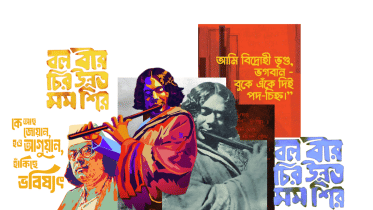Kazi Nazrul Islam’s 49th Death Anniversary
Like an undying phoenix, the spirit of Nazrul lives on
That night in December 1921, while his comrade Muzaffar Ahmed slept, Nazrul scribbled furiously. By the morning, the air was charged with something new. “Bolo Bir, Chiro Unnoto Momo Sheer…” (“I am the Rebel Eternal, / I raise my head beyond this world, / High, ever erect and alone!”) he declared. It was not merely the birth of a poem but of a cultural rupture. Critics would later see in “Bidrohi” a break from the ‘Rabindric’ serenity that had long defined Bengal’s literary landscape—a new current of words forged in fire, laced with the clang of rebellion.
26 August 2025, 18:05 PM



